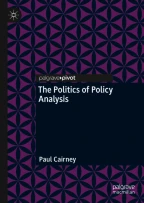How to Be a Policy Entrepreneur

This chapter compares different ways to think of entrepreneurship in policy analysis. The first is to identify the attributes, skills, and strategies that entrepreneurs need to succeed. The second is to qualify the success of entrepreneurship: most fail, and their success depends more on their environments than their skills.
This is a preview of subscription content, log in via an institution to check access.
Access this chapter
Subscribe and save
Springer+ Basic
€32.70 /Month
- Get 10 units per month
- Download Article/Chapter or eBook
- 1 Unit = 1 Article or 1 Chapter
- Cancel anytime
Buy Now
Price includes VAT (France)
eBook EUR 53.49 Price includes VAT (France)
Hardcover Book EUR 68.56 Price includes VAT (France)
Tax calculation will be finalised at checkout
Purchases are for personal use only
References
- Cairney, P. (2013). What is Evolutionary Theory and How Does it Inform Policy Studies? Policy and Politics, 41(2), 279–298. ArticleGoogle Scholar
- Cairney, P. (2018). Three Habits of Successful Policy Entrepreneurs. Policy and Politics, 46(2), 199–217. ArticleGoogle Scholar
- Cairney, P. (2020). Understanding Public Policy (2nd ed.). London: Red Globe. Google Scholar
- Cairney, P., & Jones, M. (2016). Kingdon’s Multiple Streams Approach: What Is the Empirical Impact of This Universal Theory? Policy Studies Journal, 44(1), 37–58. ArticleGoogle Scholar
- Cairney, P. and Kwiatkowski, R. (2017). How to Communicate Effectively with Policymakers: Combine Insights from Psychology and Policy Studies. Palgrave Communications, 3, 37. https://www.nature.com/articles/s41599-017-0046-8.
- Jarvis, D. S., & He, A. J. (2020). Policy Entrepreneurship and Intuitional Change: Who, How, and why? Public Administration and Development, 40(1), 3–10. ArticleGoogle Scholar
- Kingdon, J. (1984). Agendas, Alternatives and Public Policies. New York, NY: Harper Collins. Google Scholar
- Mayne, R., Green, D., Guijt, I., Walsh, M., English, R., & Cairney, P. (2018). Using Evidence to Influence Policy: Oxfam’s Experience. Palgrave Communications, 4(122), 1–10. https://doi.org/10.1057/s41599-018-0176-7. ArticleGoogle Scholar
- Mintrom, M. (2012). Contemporary Policy Analysis. Oxford: Oxford University Press. Google Scholar
- Mintrom, M. (2019). So you want to be a policy entrepreneur? Policy Design and Practice, 2(4), 307–323. https://doi.org/10.1080/25741292.2019.1675989. ArticleGoogle Scholar
- Room, G. (2016). Agile Actors on Complex Terrains: Transformative Realism and Public Policy. London: Routledge. BookGoogle Scholar
- Stoker, G. (2010). Translating Experiments into Policy. The ANNALS of the American Academy of Political and Social Science, 628(1), 47–58. ArticleGoogle Scholar
- Weible, C., Heikkila, T., deLeon, P., & Sabatier, P. (2012). Understanding and Influencing the Policy Process. Policy Sciences, 45(1), 1–21. ArticleGoogle Scholar
Author information
Authors and Affiliations
- Division of History, Heritage, and Politics, University of Stirling, Stirling, UK Paul Cairney
- Paul Cairney
You can also search for this author in PubMed Google Scholar
Corresponding author
Rights and permissions
Copyright information
© 2021 The Author(s), under exclusive license to Springer Nature Switzerland AG
About this chapter
Cite this chapter
Cairney, P. (2021). How to Be a Policy Entrepreneur. In: The Politics of Policy Analysis. Palgrave Macmillan, Cham. https://doi.org/10.1007/978-3-030-66122-9_10
Download citation
- DOI : https://doi.org/10.1007/978-3-030-66122-9_10
- Published : 11 February 2021
- Publisher Name : Palgrave Macmillan, Cham
- Print ISBN : 978-3-030-66121-2
- Online ISBN : 978-3-030-66122-9
- eBook Packages : Political Science and International StudiesPolitical Science and International Studies (R0)
Share this chapter
Anyone you share the following link with will be able to read this content:
Get shareable link
Sorry, a shareable link is not currently available for this article.
Copy to clipboard
Provided by the Springer Nature SharedIt content-sharing initiative

